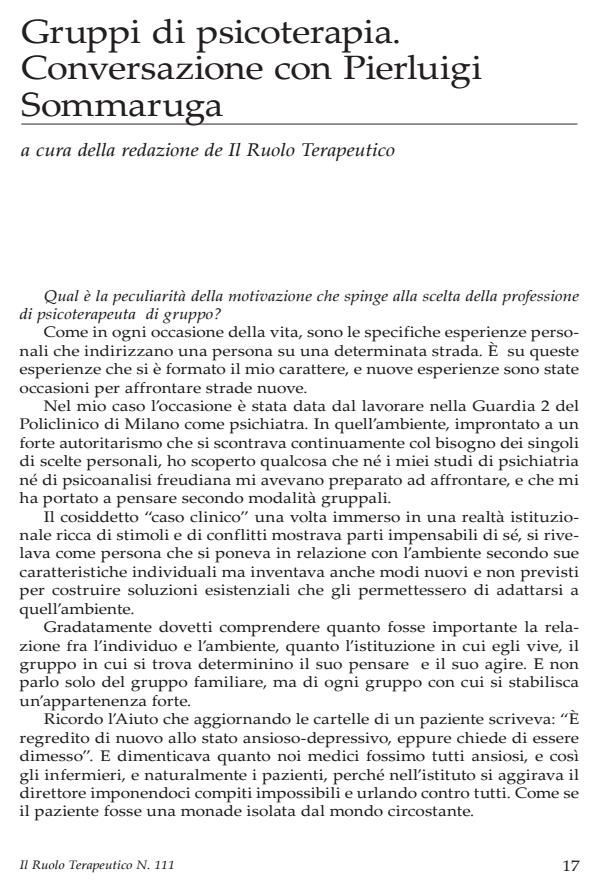Gruppi di psicoterapia. Conversazione con Pierluigi Sommaruga
Journal title RUOLO TERAPEUTICO (il)
Author/s
Publishing Year 2009 Issue 2009/111 Language Italian
Pages 14 P. 17-30 File size 261 KB
DOI 10.3280/RT2009-111004
DOI is like a bar code for intellectual property: to have more infomation
click here
Below, you can see the article first page
If you want to buy this article in PDF format, you can do it, following the instructions to buy download credits

FrancoAngeli is member of Publishers International Linking Association, Inc (PILA), a not-for-profit association which run the CrossRef service enabling links to and from online scholarly content.
Group psychotherapy. conversing with Pierluigi Sommaruga - Sommaruga is convinced that his personal experiences led him to group analysis. He has no doubts about defining his work with groups as being psychoanalytic. His theoretical orientation is modern relational psychoanalysis. He calls his way of working interpersonal psychoanalysis or group analysis, where the focus is on the single individuals without losing sight of what happen in the group. He emphasizes how his leadership style has changed over time: today he prefers to work with the relational models of the single members rather than with the group as a whole. He considers the transference in group analysis to be the reenactment of relational experiences with the opposite sex, with persons who had a particular role in the life of the patients, rather than with parental figures. The group seling contains a wealth of information and reveals unsuspected aspects of the patient’s relational world. He feels that the ideal criteria in forming a group is the selection of persons with similar problems, but with different ways of dealing with them so that the group is neither too conflictual nor too cohesive. This is an extremely delicate phase in which errors of evaluation by the therapist are possible. He feels that group treatment is possible only if the position of authority of the therapist is recognized. In the case in which it is not possible to resolve certain individual conflicts in the group, he proposes a series of individual sessions with the patient, avoiding the creation of two impermeable seings. He feels that the effectiveness of analytic group work becomes evident when the patients’ projects finally become realistic and realizable. He likes to think of the group as a space where new relational events can happen, in a continuous exchange between individuals and the group.
key words: group seling, group analysis, analyst style, confrontation, leadership modalities
, Gruppi di psicoterapia. Conversazione con Pierluigi Sommaruga in "RUOLO TERAPEUTICO (il)" 111/2009, pp 17-30, DOI: 10.3280/RT2009-111004